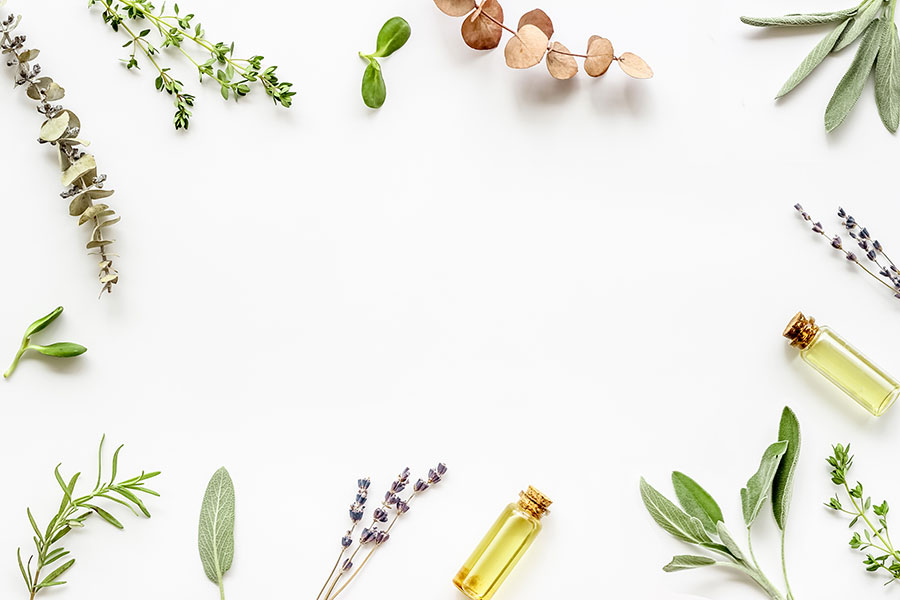You have to smell it to believe it
Aromatherapy may be a missing ‘ingredient’ for the mind.
Story: Joy Stephenson-Laws, JD
Aromatherapy’s main claim to fame is that it calms the nerves and promotes relaxation. Also called essential oil therapy, aromatherapy uses essential oils from plants, including flowers, herbs and trees, to promote health and well-being in a number of ways.
Here are the three basic ways to practice aromatherapy, according to cancer.gov:
- Indirect inhalation – This occurs, for example, when you breathe in an essential oil through a room diffuser or by placing drops of the oil on tissue or cotton and keeping it near yourself in the room.
- Direct inhalation – This is breathing in the essential oil through an inhaler containing water mixed with the oil.
- Massage – Essential oils are combined with a carrier oil, such as avocado or coconut oil, and massaged into the skin. You also can add a few drops of your favorite essential oil to your bath water or body lotion.
If you’re skeptical and see this as nothing more than “hippie dippie” medicine, hear me out. Aromatherapy may be effective at relieving stress, anxiety and depression. Essentially, through our sense of smell we can experience a positive effect on our minds.
“The olfactory nerve gives us our sense of smell and starts from our nose and enters the skull through tiny holes to connect directly to the brain. This nerve sends signals almost instantaneously to many parts of the brain, including the limbic system and amygdala, which are in charge of emotions, mood and memory,” reports Psychology Today, indicating why certain smells may remind us of a certain place or person.
“These systems are also in charge of regulating our autonomic nervous system, which can either trigger a fight-or-flight response, quickening our breath, heart rate and raising our blood pressure, or can soothe us through turning on the parasympathetic nervous system, which relaxes our bodies … Essential oils like lavender have even been shown to interact the same way biochemically that many anti-anxiety medications do on neuroreceptors,” the report continues.
Furthermore, the National Institutes of Health (NIH) reports that there is evidence that when aromatherapy was administered to women in labor, it reduced their anxiety. In addition, the NIH discusses a clinical trial in which 140 women were randomly divided into aromatherapy and non-aromatherapy groups immediately after delivering their babies. Treatment for the aromatherapy group involved inhaling three drops of lavender essential oil every eight hours for four weeks. The results revealed that the aromatherapy group overall had less stress, anxiety and depression.
These findings are extremely important because one in nine new mothers suffer from postpartum depression, according to womenshealth.gov. The NIH also reports that anxiety in mothers decreases oxytocin secretion and milk production.
It’s not just lavender oil that may be beneficial. For example:
- Wild ginger essential oil may have antidepressant effects, reports BMC Complementary Medicine and Therapies.
- Bergamot (a citrus fruit) essential oil has been shown to reduce anxiety in patients about to undergo surgery, according to a report published on the National Center for Biotechnology Information website.
- Rose essential oil may promote relaxation, states another report at ncbi.nlm.nih.gov.
- Ylang ylang (a tropical tree) essential oil may promote relaxation and ease symptoms of depression, according to a report at onlinelibrary.wiley.com.
We have to approach our health in a holistic manner and acknowledge that implementing small practices, such as spritzing our pillows with our favorite essential oil, may calm us and promote a better night’s sleep.
As always, consult a competent health-care professional before making aromatherapy a regular addition to your proactive health-care regimen. This is especially necessary for people with existing health issues and for women who are pregnant and breastfeeding. I recommend that you also seek professional advice if you are particularly interested in practicing direct inhalation aromatherapy with the use of an inhaler.
If you have allergies, sensitive skin or are battling skin conditions such as acne or psoriasis, it is best you consult your dermatologist before applying essential oils directly to your skin. And remember to mix the oil with water or a carrier oil, like coconut oil, in order to dilute the essential oil.
Lavender and tea tree essential oils have been found to have effects similar to estrogen, the female sex hormone, and also block or decrease the effect of androgens, the male sex hormones. Applying these oils to the skin over a long period of time was linked in one study to breast growth in boys who had not yet reached puberty, the National Cancer Institute reports.
Although the use of essential oils appears to be safe overall without many side effects in most cases, know that aromatherapy products do not need approval from the U.S. Food and Drug Administration.
Anyone can benefit from natural stress, anxiety and depression remedies such as aromatherapy. Enjoy your healthy life!
About the writer → Joy Stephenson-Laws, who has a juris doctor degree, is founder of Proactive Health Labs (phlabs.org) and author of “Minerals—The Forgotten Nutrient: Your Secret Weapon for Getting and Staying Healthy.”

